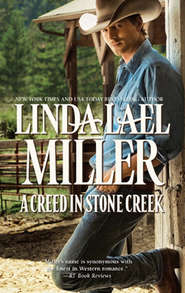По всем вопросам обращайтесь на: info@litportal.ru
(©) 2003-2024.
✖
Here and Then
Автор
Год написания книги
2018
Настройки чтения
Размер шрифта
Высота строк
Поля
To Rue’s further mortification, instead of pushing him away, as her acutely trained left brain told her to do, she rose higher on her knees and thrust herself into the kiss. It was soft and warm at first, then Farley touched the seam of her mouth with his tongue and she opened to him, like a night orchid worshiping the moon. He took utter and complete command before suddenly stepping back.
“I expect you to be settled somewhere else by nightfall,” he said gruffly. To his credit, he didn’t avert his eyes, but he didn’t look any happier about what he’d just done than Rue was.
“Get out,” she breathed.
Farley settled his hat on his head, touched the brim in a mockingly cordial way and strolled from the room.
Rue sent her pillow flying after him, because he was so in-sufferable. Because he’d had the unmitigated gall not only to come into her bedroom, but to kiss her. Because her insides were still colliding like carnival rides gone berserk.
Later, ignoring Ellen, who was watchful and patently disapproving, Rue fetched a ladder from the barn and set it against the burned side of the house. At least, she thought, looking down at her jeans and T-shirt, she was dressed for climbing.
She still wanted to find Elisabeth and make sure her cousin was all right, but there were things she’d need to sustain herself in this primitive era. She intended to return to the late twentieth century, buy some suitable clothes from a costume place or a theater troupe, and pick up some old currency at a coin shop. Then she’d return, purchase a ticket on a train or boat headed south and see for herself that Bethie was happy and well.
It was an excellent plan, all in all, except that when Rue reached the top of the ladder and opened the charred door, nothing happened. She knew by the runner on the hallway floor and the pictures on the wall that she was still in 1892, even though she was wearing the necklace and wishing as hard as she could.
Obviously, one couldn’t go back and forth between the two centuries on a whim.
Rue climbed down the ladder in disgust, finally, and stood in the deep grass, dusting her soot-blackened hands off on the legs of her jeans. “Damn it, Bethie,” she muttered, “you’d better have a good reason for putting me through this!”
In the meantime, whether Elisabeth had a viable excuse for being in the wrong century or not, Rue had to make the best of her circumstances. She needed to find a way to fit in—and fast—before the locals decided she was a witch.
Ellen had draped a rug over the clothesline and was busily beating it with something that resembled a snowshoe. Occasionally she glanced warily in Rue’s direction, as though expecting to be turned into a crow at any moment.
Rue wedged her hands into the hip pockets of her jeans and mentally ruled out all possibility of searching Elisabeth’s house for money while the housekeeper was around. There was only one way to get the funds she needed, and if she didn’t get busy, she might find herself spending the night in somebody’s barn.
Or the Pine River jailhouse.
The idea of being behind bars went against her grain. Rue had once done a brief stint in a minimum-security women’s prison for refusing to reveal a source to a grand jury, but this would obviously be different.
Rue headed for the road, walking backward so she could look at the house and “remember” how it would look in another hundred years. A part of her still expected to wake up on the couch in Aunt Verity’s front parlor and discover this whole experience had been nothing more than a dream.
Reaching Pine River, Rue headed straight for the Hang-Dog Saloon, though she did have the discretion to make her way around to the alley and go in the back door.
In a smoky little room in the rear of the building, Rue found exactly what she’d hoped for, exactly what a thousand TV Westerns had conditioned her to expect. Four drunk men were seated around a rickety table, playing poker.
At the sight of a woman entering this inner sanctum, especially one wearing pants, the cardplayers stared. A man sporting a dusty stovepipe hat went so far as to let the unlit stogie fall from between his teeth, and the fat one with garters on his sleeves folded his cards and threw them in.
“What the hell…?”
After swallowing hard, Rue peeled off her digital watch and tossed it into the center of the table. “I’d like to play, if you fellas don’t mind,” she said, sounding much bolder than she felt.
The man in the stovepipe hat had apparently recovered from the shock of seeing the wrong woman in the wrong place; he picked up the wristwatch and studied it with a solemn frown. “Never seen nothin’ like this here,” he told his colleagues.
Being one of those people who believe that great forces come to the aid of the bold, Rue drew up a chair and sat down between a long-haired gunfighter type in a canvas duster and the hefty guy with the garters.
“Deal me in,” she said brightly.
“Where’d you get this thing?” asked the one in the high hat.
“K mart,” Rue answered, reaching for the battered deck lying in the middle of the table. She thought of bumper stickers she’d seen in her own time and couldn’t help grinning. “My other watch is a Rolex,” she added.
Stovepipe looked at her in consternation and opened his mouth to protest, but when Rue shuffled the cards deftly from one hand to the other without dropping a single one, he pressed his lips together.
The gunfighter whistled. “Son of a—Tarnation, ma’am. Where’d you learn to do that?”
Rue was warming to the game, as well as the conversation. “On board Air Force One, about three years ago. A Secret Serviceman taught me.”
Stovepipe and Garters looked at each other in pure bewilderment.
“I say the lady plays,” said the gunslinger.
Nobody argued, perhaps because Quickdraw was wearing a mean-looking forty-five low on his hip.
Rue dealt with a skill born of years of practice—her grandfather had taught her to play five-card draw back in Montana when she was six years old, and she’d been winning matchsticks, watches, ballpoint pens and pocket change ever since.
Rue had taken several pots, made up mostly of coins, though she had raked in a couple of oversize nineteenth-century dollar bills, in this game when the prostitute in the pea green dress came rustling in.
The woman’s painted mouth fell open when she saw Rue sitting at the table, actually playing poker with the men, and her kohl-lined eyes widened. She set a fresh bottle of whiskey down on the table with an irate thump.
“Be quiet, Sissy,” Quickdraw said, talking around the matchstick he was holding between his teeth. “This here is serious poker.”
Sissy’s eyes looked, as Aunt Verity would have said, like two burn holes in a blanket, and Rue felt a stab of pity for her. God knew, nineteenth-century life was hard enough for respectable women. It would be even rougher for ladies of the evening.
Quickdraw picked up Rue’s watch, which was lying next to her stack of winnings, and held it up for Sissy’s inspection. “You bring me good luck, little sugar girl, and I’ll give you this for a trinket.”
“I think I may throw up,” Rue murmured under her breath.
“What’d you say?” Stovepipe demanded, sounding a little testy. Losing at poker clearly didn’t sit well with him.
Rue offered the same smile she would have used to cajole the president of the United States into answering a tough question at a press conference, and replied, “I said I’m sure glad I showed up.”
Sissy tossed the watch back to the table, glared at Rue for a moment, then turned and sashayed out of the room.
Rue was secretly relieved and turned all her concentration on the matter at hand. She had enough winnings to buy that horrible gingham dress and rent herself a room at the boardinghouse; now all she needed to do was ease out of the game without making her companions angry.
She yawned expansively.
Garters gave her a quelling look, clearly not ready to give up on the evening, and the game went on. And on.
It was starting to get embarrassing the way Rue kept winning, when all of a sudden the inner door to the saloon crashed open. There, filling the doorway like some fugitive from a Louis L’Amour novel, was Farley Haynes.
Finding Rue with five cards in her hand and a stack of coins in front of her, he swore. Sissy peered around his broad shoulder and smiled, just to let Rue know she’d been the one to bring about her impending downfall.
“Game’s over,” Farley said in that gruff voice, and none of the players took exception to the announcement. In fact, except for Rue, they all scattered, muttering various excuses and hasty pleasantries as they rushed out.
Rue stood and began stuffing her winnings into the pockets of her jeans. “Don’t get your mustache in a wringer, Marshal,” she said. “I’ve got what I came for and now I’m leaving.”
Farley shook his head in quiet, angry wonderment and gestured toward the door with one hand. “Come along with me, Miss Claridge. You’re under arrest.”











